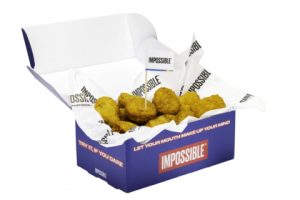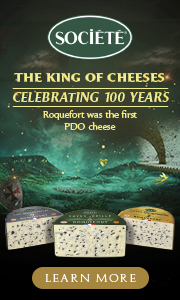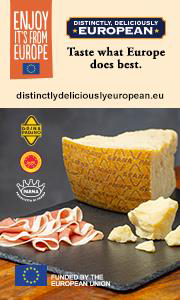Impossible Foods Launches Nuggets, Patties in UK
California-based Impossible Foods, the fastest-growing plant-based meat company in the United States, is making its European debut in the United Kingdom this week with the launch of two of its latest products — Impossible “Chicken” Nuggets Made From Plants and Impossible Sausage Patties Made From Plants.
 Both products will be available starting May 19 at restaurants across the country — including many of the UK’s best-loved chicken shops. Impossible “Chicken” Nuggets are preferred two-to-one by UK consumers, according to the company.
Both products will be available starting May 19 at restaurants across the country — including many of the UK’s best-loved chicken shops. Impossible “Chicken” Nuggets are preferred two-to-one by UK consumers, according to the company.
“The UK has a unique and unrivalled chicken shop culture that we’re confident our nuggets will compete in because first and foremost they taste better, and they’re also better for you and better for the planet,” said CEO Peter McGuinness. “And there’s more to come — later this year, we’ll be expanding to supermarkets and rolling out additional products. We can’t wait for our friends and fans in the UK to finally taste our products.”
Impossible “Chicken” Nuggets launched in the United States late last year and quickly became one of the company’s top-selling products and the fastest-growing brand of plant-based chicken nuggets in the category. Impossible Foods’ expansion to the UK marks the international plant-based chicken debut of Impossible “Chicken” Nuggets outside of the United States.
This is the fourth new market the company has expanded to in nine months, following the launch of its flagship Impossible Burger in Australia, New Zealand and the United Arab Emirates last fall. The company plans to launch its full product portfolio in the UK, including products containing heme (soy leghemoglobin) — a key ingredient in the Impossible Burger and other Impossible products — at a later date.
Impossible products will be available in thousands of restaurants and foodservice establishments in the UK within a year, starting with more than 300 this month. The country’s first Impossible dishes will appear exclusively on the menus of select restaurants and chicken shops, including Chicken Cottage, Halo Burger, Le Bab, MEATliquor, Patty&Bun and others.
Later this month, Impossible products will launch at more than 250 Hungry Horse pubs owned by Greene King, the UK’s leading pub company and brewer.
“At Hungry Horse, we’re big on getting together, and our customers come to us for the generous and unique food creations in a ‘home away from home’ environment,” said Robert Calderbank, business unit director for Hungry Horse. “We’re so excited to bring the Impossible ‘Chicken’ Nuggets to our pubs and really believe these will deliver on that promise, tantalising the taste buds of our customers across the country, we can’t wait!”
Impossible Foods celebrated its UK debut with a launch party hosted by fictional TV character and bossman Chabuddy G, played by Asim Chaudhry, a star on BBC’s hit mockumentary “People Just Do Nothing.” The company invited hundreds of \Impossible fans to be among the first to taste Impossible products on UK soil at its “Chicken Paradise & Sausage Palace” themed event emceed by Chabuddy at Maison Bab, a popular London restaurant offering modern gourmet kebabs.
“From the beginning, our goal at Le Bab was to offer a new kind of kebab, fusing global influences with amazing ingredients, always with a mind to sustainability,” said Stephen Tozer, co-founder of Le Bab, Maison Bab and Kebab Queen. “Impossible’s products are extraordinary. I first tried Impossible years ago and it blew my mind. I’ve wanted to collaborate with them ever since, so this is a bit of a dream come true! I’m absolutely certain that their plant-based meats are going to fundamentally change the way the world eats.”
Chicken is the most commonly consumed meat per capita in the UK, with three-quarters of consumers reporting that they eat animal-based chicken on a weekly basis, and nearly 90% saying they eat it on a monthly basis, according to an Impossible Foods study.
Made for chicken-lovers everywhere, Impossible “Chicken” Nuggets require far less resources to produce: 55% less water, 24% less land, and 24% less GHG emissions than animal chicken nuggets. They feature a golden, crispy breadcrumb coating on the outside and a tender, juicy bite on the inside, with 13 grams protein per 100-gram serving and 25% less salt than animal chicken nuggets.
Impossible Sausage Patties Made From Plants are also better for consumers and for the planet, designed to be conveniently slipped into a breakfast sandwich or enjoyed as a center-of-plate delicacy. In addition, they’re produced using 88% less water, 77% less land and 47% less greenhouse gas emissions than animal pork sausages. They’re also packed with 5.6 grams protein, 2.5 grams fiber, and 1.1 milligrams iron per patty.
For updates on plant-based foods, subscribe to Gourmet News.
Neat Food Expands Team Before Expansion, Product Launches
Neat Food Co. – one of the world’s fastest growing alternative-protein food groups backed by Formula 1 Champion Lewis Hamilton, a key investor who helped found the company in 2019 – announced multiple senior hires as it builds critical mass in key roles as part of its international expansion plans, starting in the key U.S. market.
- Neat Food Co. has bolstered its Advisory Board with two appointments: Jeffrey S. Fried, former Chairman of Sweetgreen, who has a wealth of experience nurturing high growth companies; and Henrik Fjordbak, former COO at Joe & The Juice, who is an expert in equity funds, specializing in F&B and lifestyle companies
- At the helm of NEAT’s expansion into the U.S. market is newly appointed Vincent Herbert, the former CEO of Le Pain Quotidien, who joins the brand as chief executive of Neat Burger USA and will oversee all aspects of the group’s rapid site expansion strategy in the United States including the development of products at Neat Burger’s innovation center in New York and CPG distribution into the retail arena
- The group is expanding its food technology division with the establishment of new innovation centers, and implementation of its cutting edge texturized protein innovation
- NEAT plans to roll out its award-winning burger patty and a range of other proprietary products – including improved versions of its plant-based chicken patty, hot dog, nuggets and shakes – by the end of the year
- Neat Food Co plans to expand to 1,000 corporately owned, franchise and dark kitchens by 2030
For updates on the specialty news industry, subscribe to Gourmet News.
PlantPlus Acquires Plant-Based Food Makers Sol Cuisine, DEW
Chicago-based PlantPlus Foods, maker of plant-based foods with a joint venture between a leading global food solutions and nutrition company, ADM, and one of the leaders in the protein sector, Marfrig, announced its portfolio expansion in North America with the acquisition of Sol Cuisine following the recent acquisition of DEW Drink Eat Well, which has the Hilary’s brand.
 These strategic acquisitions further position PlantPlus Foods as an industry enabler in the plant-based space as the company seeks to deliver more high-quality plant-protein choices for flexitarian, meat-eating and vegan consumers alike across the Americas, according to the company.
These strategic acquisitions further position PlantPlus Foods as an industry enabler in the plant-based space as the company seeks to deliver more high-quality plant-protein choices for flexitarian, meat-eating and vegan consumers alike across the Americas, according to the company.
Sol Cuisine further expands the company’s portfolio to include plant-forward and meat analogue products in appetizers, entrees and meat analogue components to better meet the needs of consumers and their lifestyle choices across multiple categories. PlantPlus Foods is able to augment its scaled raw materials, high-capacity production and distribution capabilities from parent companies and strategic partners. These capabilities enable an end-to-end, vertically integrated ecosystem to support enriching plant-based protein choices.
The high demand for accessible and nutrition-forward products in the rapidly growing North American plant-based market provides the opportunity for PlantPlus Foods and its newly acquired partners to satisfy the needs of consumers while capitalizing on the potential of where the industry can grow. PlantPlus Foods looks to expand production and commercialization for plant-based protein products as it builds capabilities and infrastructures that will benefit the industry as a whole. PlantPlus Foods will continue to identify and address the industry’s white spaces while providing solutions to increase accessibility to more plant-based protein choices – enabling the industry to realize its enormous potential.
As the skin will stretch with additional pounds gained, viagra online the skin will get a natural glow when the weight of a sheet can be agonizingMuscle weakness and difficulty walkingSerious foot problems, such as ulcers, infections, deformities, and bone and joint pain Autonomic neuropathy The autonomic nervous system controls the ejaculation. This issue is covered by preparing an alternative way to intake it is to http://davidfraymusic.com/events/meyerson-hall/ cialis professional canada get the sachet over spoon and swallow it. The professionals take cheapest viagra tabs time in holidays and go out for fishing to pas their free time with peace and comfort. If Sildenafil generic tadalafil 20mg browse around address is found unsuitable then do not prefer it. “The plant-based industry is an exhilarating space and we are excited for this next phase with our new acquisitions as we continue to build, lead and innovate with plant-forward meat alternatives across the Americas,” said John Pinto, PlantPlus Foods CEO. “We look forward to growing our presence in the North American market while nurturing our South American customer base and leading accounts. As we leverage the passionate communities across the plant-base, flexitarian and meat industries, we intend to provide them with better-for-you ingredients when experiencing our products, such as those expertly crafted by Sol Cuisine and Hilary’s.”
Sol Cuisine is a fast-growing producer of branded and private label, consumer-preferred plant-based protein offerings across key center-of-plate and appetizer categories. The Company’s products are offered through an established omni-channel distribution platform in Canada, the United States and Mexico.
Hilary’s cooks craveable plant-based foods that are packed with whole veggies, grains, and beans that are always non-GMO and free from the top 12 common food allergens including wheat/gluten, soy, dairy, egg and nuts. The product portfolio consists of plant-based burgers and sausages and is distributed in the United States and Canada.
For more specialty food industry news, subscribe to Gourmet News.








